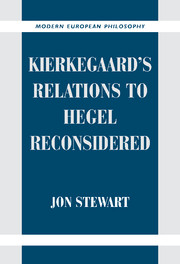Book contents
- Frontmatter
- Contents
- Acknowledgements
- Abbreviations of Primary Texts
- Preface
- Introduction
- 1 Kierkegaard and Danish Hegelianism
- 2 Traces of Hegel in From the Papers of One Still Living and the Early Works
- 3 The Ironic Thesis and Hegel's Presence in The Concept of Irony
- 4 Hegel's Aufhebung and Kierkegaard's Either/Or
- 5 Kierkegaard's Polemic with Martensen in Johannes Climacus, or De omnibus dubitandum est
- 6 Kierkegaard's Repetition and Hegel's Dialectical Mediation
- 7 Hegel's View of Moral Conscience and Kierkegaard's Interpretation of Abraham
- 8 Martensen's Doctrine of Immanence and Kierkegaard's Transcendence in the Philosophical Fragments
- 9 The Dispute with Adler in The Concept of Anxiety
- 10 The Polemic with Heiberg in Prefaces
- 11 Subjective and Objective Thinking: Hegel in the Concluding Unscientific Postscript
- 12 Adler's Confusions and the Results of Hegel's Philosophy
- 13 Kierkegaard's Phenomenology of Despair in The Sickness unto Death
- 14 Kierkegaard and the Development of Nineteenth-Century Continental Philosophy: Conclusions, Reflections, and Reevaluations
- Foreign Language Summaries
- Bibliographies
- Subject Index
- Index of Persons
8 - Martensen's Doctrine of Immanence and Kierkegaard's Transcendence in the Philosophical Fragments
Published online by Cambridge University Press: 13 March 2010
- Frontmatter
- Contents
- Acknowledgements
- Abbreviations of Primary Texts
- Preface
- Introduction
- 1 Kierkegaard and Danish Hegelianism
- 2 Traces of Hegel in From the Papers of One Still Living and the Early Works
- 3 The Ironic Thesis and Hegel's Presence in The Concept of Irony
- 4 Hegel's Aufhebung and Kierkegaard's Either/Or
- 5 Kierkegaard's Polemic with Martensen in Johannes Climacus, or De omnibus dubitandum est
- 6 Kierkegaard's Repetition and Hegel's Dialectical Mediation
- 7 Hegel's View of Moral Conscience and Kierkegaard's Interpretation of Abraham
- 8 Martensen's Doctrine of Immanence and Kierkegaard's Transcendence in the Philosophical Fragments
- 9 The Dispute with Adler in The Concept of Anxiety
- 10 The Polemic with Heiberg in Prefaces
- 11 Subjective and Objective Thinking: Hegel in the Concluding Unscientific Postscript
- 12 Adler's Confusions and the Results of Hegel's Philosophy
- 13 Kierkegaard's Phenomenology of Despair in The Sickness unto Death
- 14 Kierkegaard and the Development of Nineteenth-Century Continental Philosophy: Conclusions, Reflections, and Reevaluations
- Foreign Language Summaries
- Bibliographies
- Subject Index
- Index of Persons
Summary
Philosophical Fragments was published on June 13, 1844, with Johannes Climacus as author and Kierkegaard himself as editor. It is often claimed that the title of the work, Philosophical Fragments or a Fragment of Philosophy, is intended as an ironic criticism of systematic philosophy. In the text of the Fragments itself Hegel's name comes up directly only three times: twice in footnotes and once in its adjectival form in reference to Hegelians. Hegel is also mentioned in preliminary drafts of the work. There appear, moreover, a number of philosophical terms, such as “the system,” “mediation,” and “the absolute method,” which seem to be associated with Hegel or at least with Hegelians. These references are often found among criticisms of contemporaries such as Martensen and Grundtvig. It will thus be necessary to evaluate each of these references in order to determine to what degree they can be regarded as genuine allusions to Hegel.
In the Concluding Unscientific Postscript, the same pseudonymous author, Johannes Climacus, criticizes a review of the Fragments, which he believes overlooks essential aspects of the book. The review came from the pen of the Hegelian Andreas Frederik Beck (1816–61) and appeared in a German journal for theology.
- Type
- Chapter
- Information
- Kierkegaard's Relations to Hegel Reconsidered , pp. 336 - 377Publisher: Cambridge University PressPrint publication year: 2003

